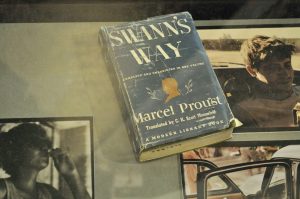 Swann’s Way was a tough book, and I found it quite challenging to grasp the true meaning of what I was reading. In my opinion, it had an incredibly nonsensical storyline while somehow remaining mysterious and relatively engaging. Proust was eloquent in his writing, often using multiple adjectives to describe one thing or event. As a result, I found myself highlighting a fair amount of words and having to search up their meanings to understand what Proust was referring to. I immediately noticed that he used many similes and metaphors to augment his extraordinarily detailed and comprehensive writing style.
Swann’s Way was a tough book, and I found it quite challenging to grasp the true meaning of what I was reading. In my opinion, it had an incredibly nonsensical storyline while somehow remaining mysterious and relatively engaging. Proust was eloquent in his writing, often using multiple adjectives to describe one thing or event. As a result, I found myself highlighting a fair amount of words and having to search up their meanings to understand what Proust was referring to. I immediately noticed that he used many similes and metaphors to augment his extraordinarily detailed and comprehensive writing style.
It was hard for me to follow the trajectory of this story; however, I was able to grasp some parts of the book. This story seems to be about an upper-class family and their relationships and issues with each other and their neighbour, M. Swann. The narrator, seemingly a younger and partially fictional version of Marcel Proust, was almost speaking directly to us while describing his environment and some of his struggles. One of the parts that I enjoyed was when the narrator described his grandmother. His love for her shone through the pages, and it made me think of my grandmother. The part of his description that I particularly enjoyed was when he compared her “mauve” cheeks to “plowed fields in autumn” (13). I thought this was a lyrical and resonant simile.
The other part of the book that also stuck out to me was the significance of the kiss from his mother. It seemed apparent that the narrator found ritual in his mother’s kiss and had trouble sleeping if this ritual was not fulfilled. However, when M. Swann comes over, the narrator has an inner conflict when he is sent off to bed without his mother’s kiss. He struggles to fall asleep without the kiss and decides to send a note to her asking her to visit his room. When M. Swann leaves their home, both his mother and father find the boy awake, and he expects them to be angry with him. However, rather than punishing him, his emotions, for the first time, are validated by his parents. This seems to be a turning point for the narrator, as he says he could finally “cry without sin” (38). The significance of our mother’s affection and fear of being scolded for remaining awake are common in childhood; therefore, this part seems to create a sense of common ground between the narrator and readers.
The final thing that stuck out to me was a line in the introduction with which I highlighted:
“The artist escapes the tyranny of time through art” (introduction xi).
I believe this perfectly describes Proust’s writing, as he somehow manages to articulate a short stretch of time in the longest, but still artful, possible way.
I left this story with many questions, one, however, being: what is the significance of M. Swann’s character in this book and the development of the young boy?
